What Your Constipation is Really Telling You

Going days or sometimes weeks without a bowel movement can be not only painful, but harmful. And when you try to go to the bathroom, sitting on the toilet for an extended period of time is not only frustrating, but detrimental.
Hemorrhoids, rectal prolapse, and anal fissures result from straining during bowel movements and sitting on the toilet for long periods of time.
Increased pressure on the veins around the anus and rectum can lead to hemorrhoids. The connective tissues that support and hold hemorrhoids in place can weaken, leading to rectal prolapse, a condition in which the rectum protrudes through the anus. Passing hard or large stool can cause anal fissures, which are small tears in the skin of the anus.7
The ROME III Criteria for Constipation is what many practitioners refer to when a patient complains of constipation. It requires the presence of two or more of the following:
- Straining in ≥ 25% of defecations
- Lumpy or hard stool in ≥ 25% defecations
- Sensation of incomplete evacuation in ≥ 25% of defecations
- Sensation of anorectal obstruction/blockade in ≥ 25% defecations
- Manual maneuvers to facilitate ≥ 25% defecations (e.g., digital evacuation, pelvic floor support)
- Fewer than 3 defecations/week
- Additional criteria:
- Stool rarely loose without the use of laxatives
- Criteria insufficient to indicate irritable bowel syndrome2
With that said, it’s important to determine the type of constipation that you’re suffering from, as well as the triggers and root causes.
Let’s plunge into the details.

What Exactly is Constipation?
Constipation occurs when daily bowel movement frequency and/or consistency decreases. It can be very troublesome to those affected by it, because going to the bathroom requires lots of time, effort, and anxiety.
Normal bowel movements are considered at least once a day, in the form of soft, well-formed stools, whereas constipated stools are infrequent, hard, small in size, strained, and difficult to eliminate.
Constipation affects about 20% of men and women in North America.1 It’s often a byproduct of poor diet, lack of exercise, medications, disease, insufficient water intake, and stress.
Chronic constipation can be divided into two categories: primary/functional and secondary.
Functional constipation is defined by the Rome III diagnostic criteria and is used by practitioners.
The Bristol Stool Chart is a visual scale to help patients measure the quality of their stools so that they can describe their bowel movements to a practitioner.
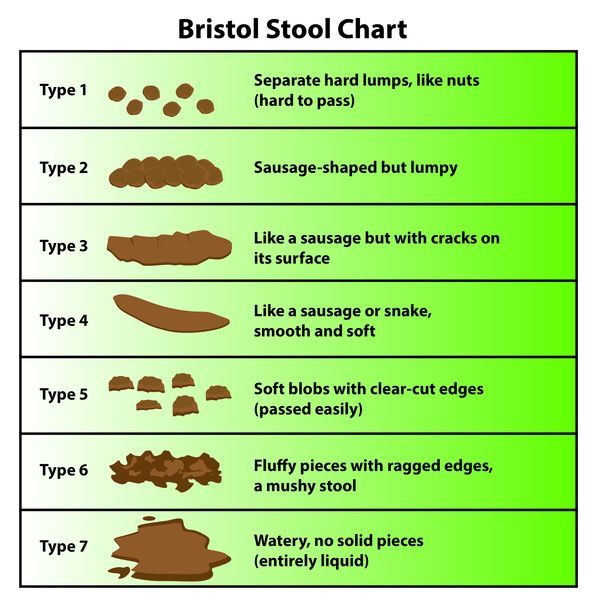
The Bristol Stool Chart
The Bristol Stool Chart provides a visual and numeric scale to identify the quality of stools.
Types one, two, and three are hard or compacted stools that are associated with constipation; types four and five are normal; type six is loose; and type seven is diarrhea.
You ideally want to be producing stools in the type 4 – type 5 range, with type 4 being the holy grail of stool.
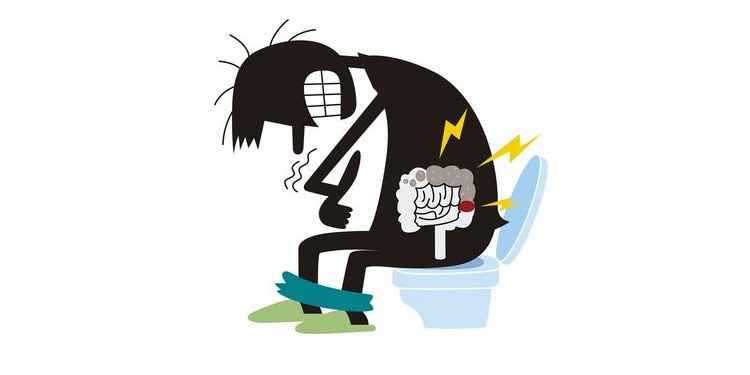
Effects of Constipation
Diverticular disease can develop when small, dry, hard stools create a pressure that damages the colon walls.
Damage in the walls of the large intestine leads to the formation of bulging pouches called diverticula, which can become inflamed, resulting in diverticulitis.8
Fecal impaction occurs when hard, dry stool in the rectum blocks the passage of other feces.
This sometimes develops in people who suffer from constipation, especially when the constipation has been chronic. Fecal impaction leads to abdominal cramps, bloating, straining, rectal pain, and bleeding when attempting to pass stool.9
Bowel perforation occurs when hardened fecal matter ruptures the intestinal wall and leaks into the abdominal cavity, causing a severe infection. This tear can lead to peritonitis, inflammation of the membrane that lines the abdominal cavity caused by the introduction of bacteria, and sepsis, which can be life-threatening.

Constipation can also cause harmful toxins to build up in the body as waste products sit in the gut for extended periods rather than being eliminating quickly. These toxins can ultimately alter metabolism and liver function or produce dysbiosis.
Liver Function: The liver acts as your body’s filtration system to neutralize and eliminate toxins.
Under normal conditions, your liver takes toxins from processed foods, environmental chemicals, alcohol, medications, and the by-products your body naturally produces as it works, and excretes them as waste.10
When constipation occurs, the time required for food to pass through the GI tract slows down, waste remains in the colon longer, and toxins are absorbed back into the bloodstream. The liver eventually becomes overworked trying to get rid of all these extra toxins and can no longer efficiently filter them, instead allowing them to recirculate.
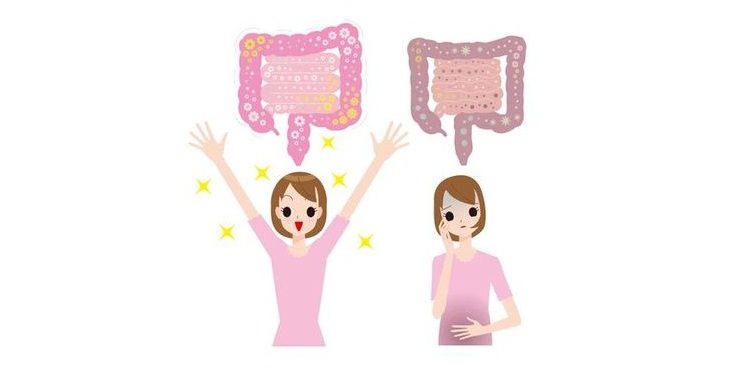
Dysbiosis: Dysbiosis is an imbalance of the good and bad GI organisms influenced by constipation. When fecal matter sits in the intestines for prolonged periods, bacteria can act on it, resulting in the recirculation of toxins and hormones.
The intestinal microflora plays a key role in enterohepatic circulation (that is, circulation between the small intestinal and liver) of hormones, especially estrogens.
The bacteria deconjugate, or break down, estrogens that were just packaged for elimination by the liver, allowing the free hormones to be reabsorbed.11 This can be detrimental if you are predisposed to estrogen-related conditions such a estrogen dominance or certain cancers.
A similar process occurs when bacteria act on liver-processed toxins, unbinding them and allowing them back into circulation. Recirculation of unbound toxins and hormones further stresses the liver and increases oxidative damage and inflammation.

Types of Constipation
Primary constipation describes problems with the actual functioning of the colon and anorectal areas. This type of constipation can be divided into three subtypes: normal transit, slow transit, and outlet constipation.
- Normal-transit constipation occurs when the stool passes through the colon at a normal rate and with normal frequency, but is accompanied by difficult evacuation, hard stools, and bloating.3
- Slow-transit constipation is produced by decreased colonic motility—when the rhythmic muscle contraction and relaxation that moves stools through the colon is slower than normal—and infrequent bowel movements. Sufferers may also experience abdominal bloating and discomfort.4
- Outlet constipation (also known as pelvic-floor dysfunction) can happen in people who have either normal or slow-moving colon transport; the difference is that the stool is not expelled when it reaches the rectum because of a defect in the neuromuscular coordination necessary for stool evacuation. Excessive straining and rectal discomfort are common complaints.4,5
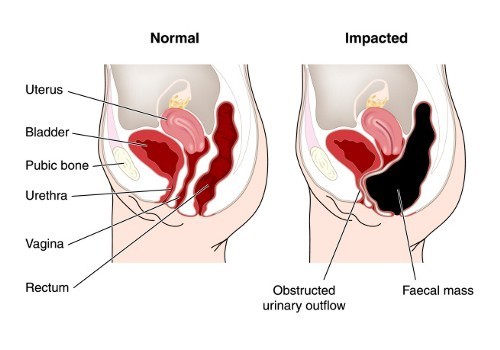
Secondary constipation is a by-product of other processes in the body; these can be certain medical conditions, medications, stress, lifestyle, and diet.6 Multiple processes can occur simultaneously in secondary constipation as well, having a compounding or overlapping effect. Some of the underlying conditions (which we’ll dive more into later) include:
- Endocrine/Metabolic Disorders: Diabetes, thyroid conditions, hypercalcemia, hypomagnesemia, pregnancy, hypokalemia, and autoimmune conditions.
- Neurologic Disorders: Spinal cord injuries, Parkinson’s disease, cerebrovascular accident (stroke), multiple sclerosis, Hirschsprung’s disease, and nerve damage.
- Gastrointestinal Disorders: Irritable Bowel Syndrome (Crohn’s and ulcerative colitis), celiac, diverticulitis, SIBO, and GI infections.
- Psychological: Depression, anxiety, stress, postpartum.
- Diet/Lifestyle: low fiber and high refined carbohydrate/sugar diet, dehydration and little/no exercise.

Root Causes of Constipation
The causes of constipation vary from person to person, and multiple factors may contribute together.
The main triggers are:
Low Fiber/High Carbohydrate Diet: Soluble and insoluble fiber are needed for normal bowel function and healthy intestinal flora, as they provide nutrients to the good bacteria and increase stool bulk to make elimination easier.
Good sources are fruits, vegetables, whole grains, nuts, seeds, and legumes. Diets high in sugar and carbohydrates promote unbalanced gut flora that can perpetuate constipation.
Dehydration: Insufficient water intake can lead to hard, dry stools, as fluids that normally help keep stools soft are absorbed in the intestines.12
Exercise: Lack of movement can be a factor in constipation, because the abdominal and intestinal muscles work together during bowel movements.13 Weak or injured muscles can decrease this movement.

Stress: Anything your body perceives to be a stressor can trigger a biochemical imbalance and an inflammatory cascade in the body.
Stress suppresses intestinal activity by activating the sympathetic fight-or-flight response, which redirects metabolic functions away from digestion in order to deal with the stressful situation.
Over time, chronic stress can cause impaired digestive function and chronic inflammation due to depleted cortisol levels.
Medications: Overuse of medications that damage the gut or block normal digestive function, such as antibiotics, antacids, proton pump inhibitors, diuretics, antidepressants, antihistamines, anticholinergics, iron supplements, narcotics, anticonvulsants, antihypertensives, calcium salts, and calcium channel blockers can all lead to constipation.14

With the triggers out of the way, let’s get to the true root of the problem. As mentioned, the causes of constipation are many, and there are often several dysfunctions occurring at the same time.
The primary underlying causes of constipation are:
Leaky Gut: Intestinal permeability, or leaky gut, occurs when the filtration mechanism in the intestines breaks down due to inflammation, which activates the immune system and causes more inflammation.
Dysbiosis: Dysbiosis, or imbalanced gut flora, can be both produced by constipation (trigger) and a root cause of constipation itself.
For some people, one process preceded the other, and telling which came first can be hard. The important factor is identifying and addressing the dysbiosis.

Toxins: We are exposed to toxins every day from medications and antibiotics, our diet, and our personal environments through the air, water, personal care products, living and working spaces, and food packaging. This can alter our bacterial balance, producing constipation.
Diet: Processed foods full of preservatives and chemicals, as well as a diet high in sugars and carbohydrates and low in fiber and nutrients, alters the GI flora and liver function, contributing to constipation.
Stress: Stress from any source will cause biochemical changes that alter the gut microflora, initiate and increase intestinal permeability, and decrease immune function. These changes can ultimately result in constipation.
Root Cause of Constipation: Leaky Gut
Leaky gut is a significant cause of constipation because of the inflammation it causes and the way it makes the intestines less efficient.
The intestines are approximately 25-30 feet long, covering a surface equivalent to a tennis court.19 60-80% of all lymph tissue in our bodies (our immune system) is located in gut-associated lymphoid tissue (GALT).20
The function of the GI tract is to absorb nutrients while keeping out toxins, dangerous organisms, and foreign matter. Intestinal permeability, or leaky gut, occurs when inflammation causes a breakdown in the filtration mechanism in the gut.
A leaky gut allows larger particles that normally cannot pass through the lining of the intestine to make their way into the bloodstream; this triggers an immune reaction and inflammation.
An easy way to think of leaky gut is “holes” in the intestinal lining that make it more permeable, allowing toxic substances to “leak” into the rest of the body. These toxins enter the body, compromising the liver, brain, skin, thyroid, colon, adrenals, joints, and sinuses.21
When the non-nutrients enter the bloodstream, the body reacts by causing inflammation, which can lead to digestive issues including bloating, gas, heartburn, abdominal pain, diarrhea, and constipation.
Other symptoms are lactose and gluten intolerance, depression, anxiety, asthma, allergies, yeast infections, fatigue, brain fog, histamine intolerance, inflammatory disorders, joint pain, skin conditions, and thyroid disorders.
Leaky gut is also the underlying cause in autoimmune disease. The main causes of leaky gut include dysbiosis, toxins, medications, a poor diet, and chronic stress.21,22

Root Cause of Constipation: Dysbiosis
One of the main causes of leaky gut is dysbiosis, or a bacterial imbalance in the gut. About 3-6 pounds (and hundreds of different species) of good bacteria lies within our gut.23
The purpose of all that bacteria is to prevent bad bacteria from digging in and growing, to maintain the GI microenvironment, to produce antibiotics, fatty acids, and nutrients, as well as to help detoxify the body from exogenous (outside your body) and endogenous (within your body) toxins.
When our microbial colonies are balanced, or symbiotic, the bacteria protect our gastrointestinal tract by making sure one specific strain doesn’t dominate. When this balance shifts and one specific strain does dominate, there is dysbiosis and our entire system becomes compromised.24
Liz Lipski, PhD, cites dysboisis “as a cause of arthritis, autoimmune illness, vitamin B deficiency, chronic fatigue syndrome, cystic acne, eczema, food allergies and food sensitivities, inflammatory bowel disease, irritable bowel syndrome, psoriasis and more.”25
Several sources can cause our microflora to become altered, including mold, yeast, parasites, viruses, and bacteria, as well as medications, toxins, poor diet, and stress.

Dysbiosis can come from multiple sources, such as mold, yeast, parasites, bacteria, and viruses, and can affect our entire bodily system.
Mold inhalation can increase your chance of developing dysbiosis, especially if you live in a damp climate or your home has moisture issues exposing you to mold or fungus. Mold exposure can have neurological effects like headaches, joint pain, and brain fog, as well as allergies, asthma, and skin issues.
Candida is a type of yeast found in the normal gut flora. It doesn’t normally cause problems, but antibiotic use or a diet high in refined carbohydrates and sugar may allow it to flourish and cause infection. Common symptoms of Candida are abdominal cramping or pain, bloating, gas, indigestion, constipation, and diarrhea.
Parasites are most commonly acquired through ingesting contaminated food and water; however, swimming in any body of water may expose you to parasites. Changing diapers and petting animals are also ways to pick one up.
According to Dr Amy Myers, MD, symptoms of having a parasite include gastrointestinal distress, disturbed sleep, skin irritation, fatigue, and joint pain.26
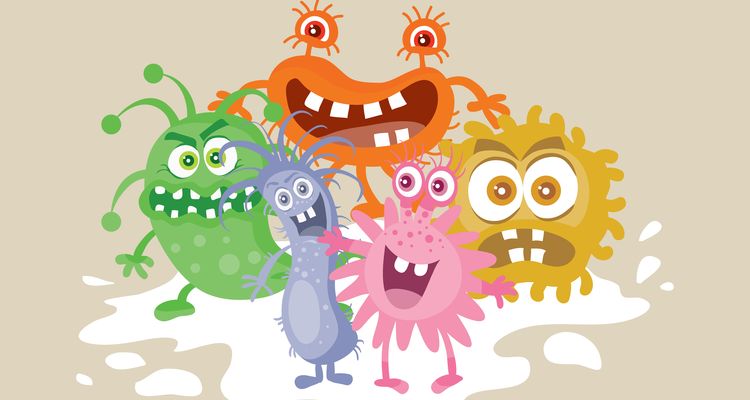
SIBO, or small intestinal bacterial overgrowth, is a condition where the bacteria in the small intestine becomes overgrown.
Chris Kresser states that SIBO has not only been shown to negatively affect the structure and function of the small intestine, but may also interfere with digestion of food and absorption of nutrients (which can lead to nutritional deficiencies).27
Symptoms of SIBO are abdominal pain/discomfort, bloating and abdominal distention, diarrhea, constipation, and gas and belching. Mark Harman says SIBO is a major cause of irritable bowel syndrome (IBS).28
Pathogenic bacterial infection from sources such as Salmonella, Campylobacter, and E. coli, or acute viral infection from rotavirus or norovirus will result in acute gastroenteritis, bringing along severe symptoms such as diarrhea, vomiting, fatigue, nausea, fever, chills, body aches, and headache. The aftermath of these types of infections can produce dysbiosis due to the alteration of the gut environment.

Root Cause of Constipation: Toxins
Toxins are everywhere in our world—in the air we breathe, in the water we drink, and in the food we ingest, as well as in prescribed and over-the-counter medicines and other environmental contaminants. Toxins are a broad contributor to dysbiosis.
Antibiotics are one of the most common causes of dysbiosis. Used therapeutically, antibiotics are prescribed to kill off the harmful organisms, chiefly bacteria, but they unfortunately also kill off the beneficial bacteria in your stomach, leaving you vulnerable to dysbiosis. Antibiotics can also promote the growth of Candida and other pathogenic fungi and yeast, because if good bacteria are absent, bad ones have room to grow.
Prescription medications that may cause constipation include opioids, anticholinergic agents, antidepressants, calcium channel blockers, statins, anti-Parkinsonian drugs, sympathomimetics, antipsychotics, and diuretics.21,30
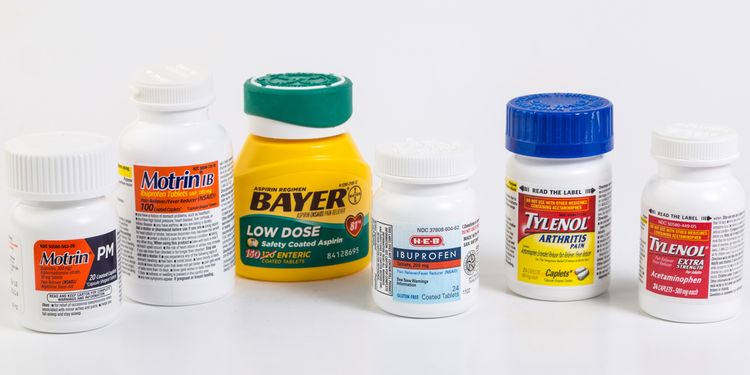
Over-the-counter (OTC) medications and supplements can also contribute to dysbiosis. Overuse of NSAIDs (non-steroidal anti-inflammatory drugs) such as ibuprofen, aspirin, naproxen, etc, are the primary contributor to OTC-induced dysbiosis.
Dr. Sara Gottfried, MD explains that “research shows that 50% – 70% of long-term NSAID users have increased leaky gut, and five days of prescription use can cause a 3x increase in permeability.”29 Antihistamines and antidiarrheal agents can prevent the growth of good bacteria and can cause bacterial imbalance. Supplements such as calcium, potassium, and iron taken in excess can also produce constipation.
Chemical sensitivities result from exposure to environmental toxins such as mercury, fungicides, pesticides, insecticides, BPA from plastics, artificial colorings, flavorings and preservatives, heavy metals, vaccines, and medical silicone found in breast implants. These toxins affect multiple organs as well as the nervous system, endocrine system, and immune system, causing symptoms such as abdominal pain, bloating, constipation, and/or diarrhea.30

Root Cause of Constipation: Diet
Poor diet is an ongoing contributor to dysbiosis since we eat food multiple times each day.
The Standard American Diet (SAD) typically consists of refined sugars, carbohydrates, and processed foods, as well as artificial food colorings, flavorings, and preservatives.
Our diets tend to lack whole food nutrients from fresh vegetables and fruit, protein, and healthy fats. This places increased stress on the immune system, gut, and liver.
Our bodies notice that the artificial chemicals are toxins, and long-term exposure can force the liver and gut into overdrive trying to clear them out. When the liver and gut can’t keep up with the metabolic demand, those toxins overflow into our bloodstream. Other foods that our body sees as toxic are alcohol and caffeine, in addition to foods contaminated by parasites and animal products that have been given hormone and antibiotic treatments.31
Food sensitivities and allergies can be another cause of dysbiosis, as the immune system reacts to the protein peptides (antigens) of the offending foods producing inflammatory chemicals called that damage the intestinal lining, not only leading to a leaky gut but also making the environment inhospitable to the good flora.
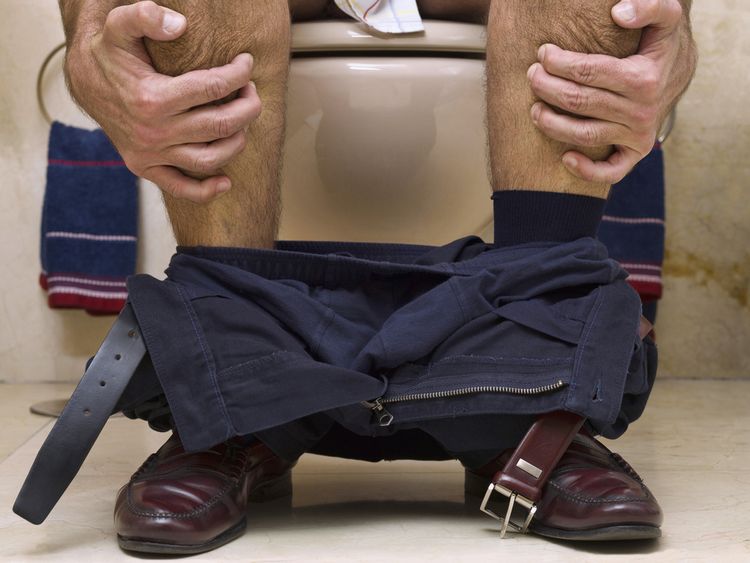
Root Cause of Constipation: Stress
Many things can stress us out, including lack of quality sleep, illness, over-exercising, poor diet, relationships, school, work, finances, and our own emotions.
The biochemical changes that accompany stress are another contributor to leaky gut and dysbiosis, as they directly impact the gut flora and the intestinal lining.
Robb Wolf contends that leaky gut is seen in people with inflammatory bowel disease (IBD), fatty liver, obesity, colon cancer, inflammatory bowel syndrome (IBS), and more. Chronic stress changes the composition of gut bacteria, killing the good bacteria you need in order to keep bad bacteria from proliferating.32
Dr. Sara Gottfried believes that “stress wrecks your gut and makes it leaky. You won’t heal your gut if it’s experiencing chronic stress.”29
Additionally, the liver and your immune and lymphatic systems can be stressed due to the toxin build-up. This creates a vicious cycle of putting even more demands on the immune system, which can’t cope and allows toxin build-up, which puts a higher demand on the immune system, and so forth. When the immune system can’t take any more stress, it becomes vulnerable, allowing microbes to take advantage of it while it’s weak. This greatly increases the odds of infection and can either trigger autoimmunity disorders or exacerbate them.33
On top of that, chronic stress decreases immunity by depleting the antibody IgA (sIgA) as well as essential hormones, and promotes inflammation, which can all result in a leaky gut.36
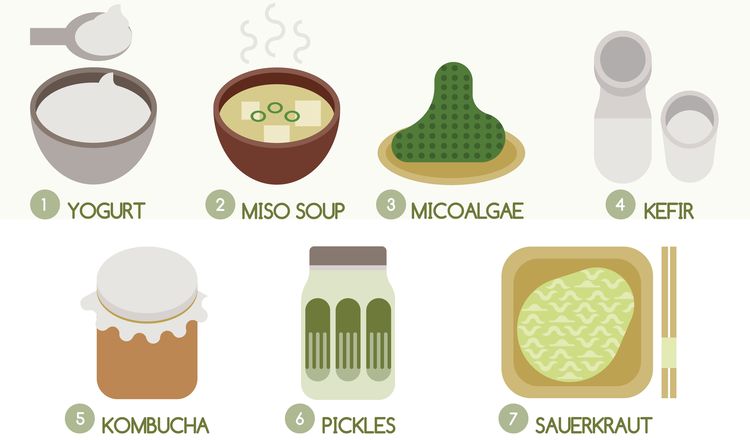
Natural Relief from Constipation
Lifestyle and dietary changes, as well as certain supplemental nutrients, can help alleviate constipation. Increased exercise, fiber, and water consumption will naturally promote regularity, as will these natural remedies:
The GI tract is filled with beneficial bacteria that help promote regularity and play an important part in digestion.
Probiotics can increase these beneficial bacteria to support healthy elimination.15 Lactobacillus acidophilus and Bifidobacterium bifidum are two of the most researched probiotic species that support a healthy flora.
We humans can’t digest prebiotic fiber from onions, garlic, blueberries, asparagus, bananas, chicory, and artichoke, so they support the growth of beneficial bacteria. The good flora help prevent constipation by maintaining colonic balance and promoting regular bowel movements.15
Black radish extract is high in fiber, which adds bulk to stool.16 Black radishes encourage the liver to produce bile and can increase peristaltic movements, further assisting the digestion process and supporting healthy elimination.
Peppermint essential oil acts as an antispasmodic, relaxing smooth muscle—the same type of muscle that lines the walls of the intestines.17 Gently massaging peppermint oil on the stomach can help alleviate abdominal discomfort.
Vitamin B5 (pantothenic acid), which can stimulate peristalsis, regulates the movement of the intestinal walls, helping them stay on consistent schedule.18
Digestive enzymes and betaine HCL may help if you have dysbiosis, a GI infection, or an autoimmune condition, as all of these conditions may reduce your body’s ability to produce enzymes and stomach acid on its own. Without the right enzymes and acid, proper digestion is difficult.

The human body requires a certain amount of vitamin C, and the body doesn’t store any beyond what it needs.
This means that the body gets rid of any extra vitamin C, which can have a laxative effect.
Taking high doses of Buffered Vitamin C, which contains magnesium and potassium salts mixed with ascorbic acid, can rapidly increase bowel movements by aiding intestinal motility.18
Magnesium deficiency often results in chronic constipation. Dr. Mark Hyman, MD, recommends using magnesium citrate. He suggests taking however much your stomach can tolerate well; the dosage may vary from 150 mg to 2000 mg or more if depleted.34
While potassium in excess can cause constipation, foods containing potassium can help to combat it. The best dietary sources are bananas, avocado, acorn squash, beans, and leafy green vegetables.
Triphala is an Ayurvedic herb from India that has a gentle laxative effect and general blood purifying properties. Typical dosing is two tablets 1-3 times daily and should increase or decrease according to your bowel movements.35
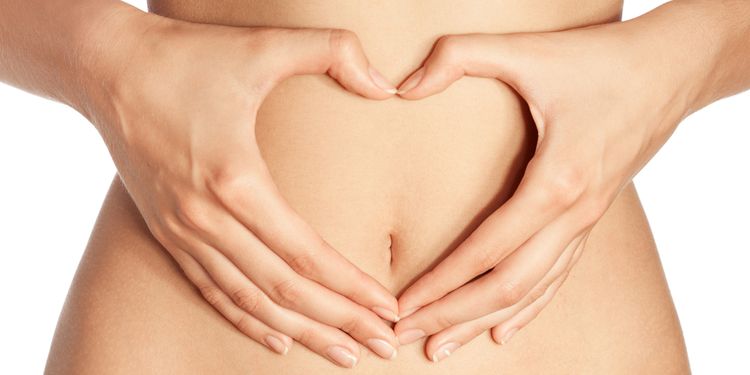
Increased fat intake produces bowel movement because bile is necessary for the digestion of fats, and once in the intestines it has a laxative effect by inducing water secretion into the colon.
Good options include coconut oil, olive oil, avocado oil, egg yolks, and grass fed/organic butter.
Abdominal self-massage may help get the bowels moving. While lying down, use your hands to create small circles moving from right to left, starting at the top of your abdomen, then progressing downward.
Squatting before your bowel movement or placing your feet on a stool in front of you during bowel movements may help induce movement by changing the alignment of your pelvis, allowing for easier passage.
Take these proven methods in stride. Don’t test everything at once. Try one intervention at a time and see what works for you.

